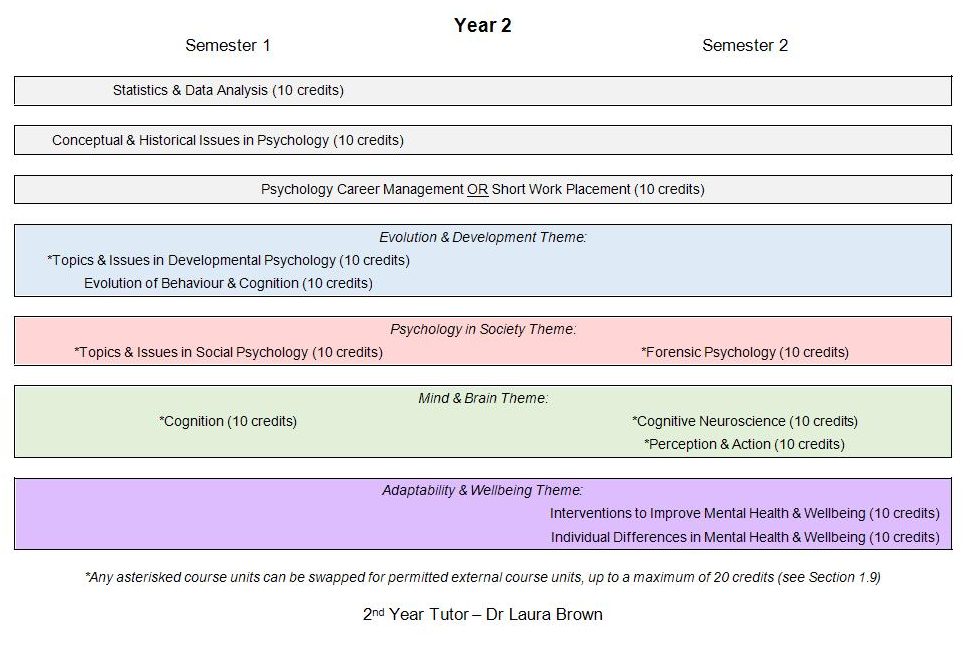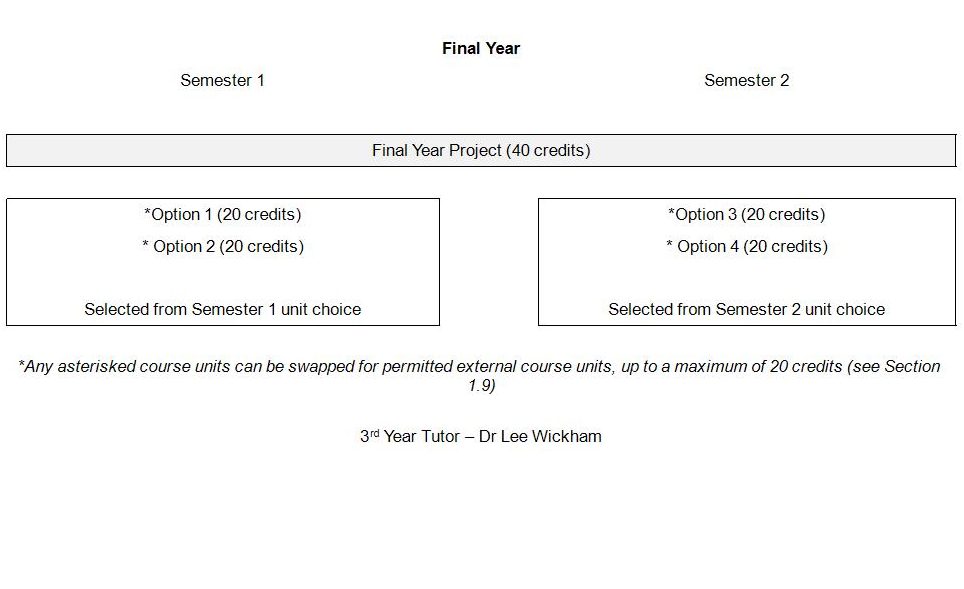3.1 Aims of the Programme
We operate within the mission of the University in its aim to provide international excellence in learning and teaching. In particular, the BSc Psychology programme aims to:
- attract students who will benefit from studying in a research-enriched environment
- provide the environment that will allow students to explore the core topics of the discipline of Psychology as outlined by the British Psychological Society, Graduate Basis for Chartered Membership (GBC)
- provide recent and advanced knowledge and research evidence coming from four themes that represent the modern discipline of Psychology: Evolution and Development; Mind and Brain; Psychology in Society; and Adaptability and Wellbeing; and to demonstrate the complex interactions between them
- provide the opportunity to study a range of research-led, specialist topics in Psychology
- focus on the contested nature of knowledge in Psychology, and provide an opportunity for students to develop skills in integrating ideas and evidence from different perspectives
- enable students to evaluate research critically and to provide them with the opportunity to develop basic skills in research
- deliver course units in ways that will encourage students to become independent, active learners
- widen participation within the body of students studying Psychology
- provide students with a skills-set that will enhance their future employability
3.2 Learning Outcomes
At the end of the undergraduate programme in Psychology, it is expected that you will:
- Knowledge & Understanding
- be able to apply multiple perspectives to psychological issues, recognising that psychology involves a range of research methods, theories, evidence and applications
- be able to integrate ideas and findings across the multiple perspectives in psychology and
- recognise distinctive psychological approaches to relevant issues
- demonstrate an understanding of psychology as a coherent and developing scientific discipline
- Intellectual Skills
- be able to generate and explore hypotheses and research questions, design and conduct empirical studies, analyse data, and interpret findings
- Be able to synthesise and critically assess information in a systematic, analytic and
- comprehensive way and clearly communicate findings and conclusions
- Be able to employ evidence-based reasoning and examine practical, theoretical and ethical issues associated with the use of different methodologies, paradigms and methods of analysis in psychology demonstrate an understanding of psychology as a coherent and developing scientific discipline
- interpret and analyse data with appropriate software and within a relevant theoretical framework
- Practical Skills
- be able to carry out empirical studies involving a variety of methods of data collection, including experiments, observation, psychometric tests, questionnaires, interviews and field studies and to do this safely, ethically and competently
- be able to analyse data using both quantitative and qualitative methods
- be computer literate, with competence in word-processing, statistical software, and accessing electronic resources
- be able to access, use and correctly cite, acknowledge and reference diverse information sources
- Transferable Skills and Personal Qualities
- be able to communicate effectively, by developing a cogent argument supported by relevant evidence, and tailoring the communication to the audience’s needs
- be able to independently gather, sift, synthesise and organise material from various sources (including library, electronic and online resources), and to critically evaluate its significance
- be able both to make written presentations using appropriate language for a target population and to collect and integrate evidence to formulate and test a hypothesis
- be able to maintain independence of thought and be self-reliant
3.3 Programme Structure
3.3.1 The Credit Rating System
Every course unit contributing to a degree is assigned a number of credits. A normal workload in one year for a full-time honours student involves the completion of course units totalling 120 credits; 10 credits represent a student workload of approximately 100 hours. This workload may include teaching contact time, group work, directed reading, independent study, assignment or presentation preparation, revision and examinations. Not only does the credit weighting of a course unit tell you how much work you are expected to do in completing it, it also tells you the weighting of the course unit in the calculation of your year average and degree classification. Course units are weighted in exact proportion to their credit rating so that, for example, course units of 20 credits are weighted twice as heavily as course units of 10 credits (see Student Progression for more detail about credits).
To meet the requirements of the honours degree programme, all students must complete course units totalling 120 credits in each year, totalling 360 credits over the three years of the degree.
There are 4 themes that run through the programme: Evolution & Development, Psychology in Society, Mind & Brain, and Adaptability & Wellbeing. These themes represent the current discipline of Psychology, and map onto the research expertise of the staff contributing to the degree. In Years 1 and 2, you will complete course units from each of the four themes, alongside units covering essential training in research methods and statistics, the study of psychology’s conceptual roots, and units designed to support your academic and professional development. In the final year you will complete a research project and your own selection of four courses from any of the four themes. Details of Final Year course units are made available around Easter in your 2nd year.
All course units in Year 1 are compulsory. In Years 2 and 3 you can elect to take up to 40 credits from University College and BMap courses, but there are restrictions on this. See Section 3.4: External Course Unit Options.
3.4 External Course Options
Students registered on BSc Psychology are able to substitute Psychology units worth a maximum of 40 credits over the course of the degree:
- In Year 2, up to 20 credits from University College for Interdisciplinary Learning (UCIL)
- In Final Year, up to 20 credits from University College for Interdisciplinary Learning (UCIL), Business and Management for all Programmes (BMap) or Manchester Enterprise Centre (MEC).
Because your degree is accredited by the British Psychological Society, certain year 2 Psychology units are compulsory.
- Year 2 Psychology units you can drop:
- Topics and Issues in Developmental Psychology (Semester 1)
- Current Issues in the Psychology of Language and Communication (Semester 1)
- Topics and Issues in Social Psychology (Semester 1)
- Forensic Psychology (Semester 2)
- Cognitive Neuroscience (Semester 2)
- Perception and Action (Semester 2)
- Year 2 Psychology units you cannot drop:
- Statistics and Data Analysis (Semester 1)
- Evolution of Behaviour and Cognition (Semester 1)
- Conceptual and Historical Issues in Psychology (Semester 1)
- Individual Differences in Mental Health and Wellbeing (Semester 2)
- Interventions to Improve Mental Health and Wellbeing (Semester 2)
- Psychology Futures/Psychology Futures with Work Placement (All Year)
The grade that you achieve for assessed work on the non-Psychology elective will be used to calculate your final year average or degree classification in the same way that a grade obtained from a psychology course unit would be.
“The University College for Interdisciplinary Learning presents an opportunity for students at The University of Manchester to broaden their educational horizons. It will offer courses that showcase the research and knowledge found at the University and encourage students to go beyond the boundaries of their degree programme.”
A list of permitted external course units will be made available to students in advance of the application process. In the meantime, you can find out more by visiting the scheme websites:
University College: http://www.college.manchester.ac.uk/courses/
Enterprise Centre: https://mec.portals.mbs.ac.uk/StudyEnterpriseWithUs/Undergraduateunits.aspx




